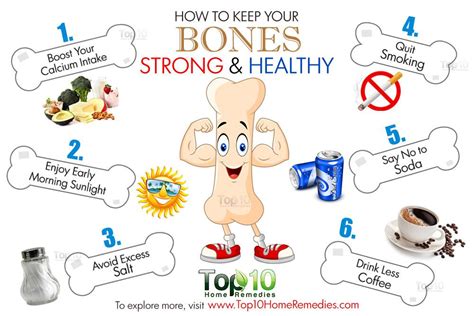How to Improve Your Bone Health as You Age

As we age, maintaining strong and healthy bones becomes increasingly important. Bones are not just the framework that supports our body—they also play crucial roles in protecting organs, storing minerals, and enabling movement. However, as we get older, our bones naturally lose density, which can increase the risk of fractures, osteoporosis, and other bone-related conditions. Fortunately, there are several strategies that can help improve and preserve bone health as you age. By incorporating the right nutrients, exercises, and lifestyle habits, you can keep your bones strong and resilient for years to come.
Ensure Adequate Calcium Intake
Calcium is the most vital mineral for bone health. It is the primary building block of bone tissue, and your body needs an adequate supply to maintain bone density and strength. As you age, your ability to absorb calcium decreases, so it’s essential to consume enough through your diet or supplements if needed.
How to Ensure Adequate Calcium:
- Dietary Sources: Dairy products (milk, cheese, yogurt), leafy green vegetables (kale, bok choy), fortified foods (tofu, plant-based milk), and fish with edible bones (sardines, salmon).
- Supplements: If you have difficulty getting enough calcium from food, calcium supplements may be an option. Talk to your doctor about the appropriate dosage.
Recommended Daily Intake:
- For adults aged 19–50: 1,000 mg/day
- For adults aged 51+: 1,200 mg/day
Boost Vitamin D Levels
Vitamin D is essential for calcium absorption. Without enough vitamin D, your body cannot effectively use the calcium you consume, which can lead to weakened bones. As we age, the skin’s ability to synthesize vitamin D from sunlight decreases, making it even more important to ensure adequate intake through food or supplements.
How to Increase Vitamin D:
- Sunlight: Aim for 15-30 minutes of direct sunlight exposure each day, depending on your skin type and geographical location.
- Dietary Sources: Fatty fish (salmon, mackerel, tuna), fortified foods (milk, orange juice, cereals), egg yolks, and mushrooms.
- Supplements: If you're unable to get enough vitamin D from the sun or food, supplements may be necessary. A blood test can help determine if you’re deficient.
Recommended Daily Intake:
- Adults aged 19–70: 600 IU/day
- Adults aged 71 and older: 800 IU/day
Engage in Weight-Bearing and Strength-Training Exercises
Exercise is a powerful tool for promoting bone health. Weight-bearing activities like walking, jogging, hiking, and dancing help stimulate bone formation and increase bone density. Strength-training exercises, which involve lifting weights or using resistance bands, help strengthen muscles, providing better support for your bones.
Best Exercises for Bone Health:
- Weight-Bearing Exercises: Walking, jogging, hiking, stair climbing, dancing, and tennis.
- Strength-Training Exercises: Lifting weights, resistance bands, squats, lunges, and body-weight exercises like push-ups and planks.
- Balance and Flexibility Exercises: Yoga and Tai Chi can help improve balance and coordination, reducing the risk of falls and fractures.
Frequency: Aim for at least 30 minutes of moderate physical activity most days of the week, with a combination of weight-bearing and strength-training exercises.
Maintain a Healthy Diet
A well-balanced diet rich in essential nutrients supports bone health and overall well-being. In addition to calcium and vitamin D, other nutrients such as magnesium, potassium, vitamin K, and vitamin C play vital roles in maintaining strong bones.
Bone-Supporting Nutrients and Their Sources:
- Magnesium: Found in nuts, seeds, leafy greens, whole grains, and legumes.
- Potassium: Found in bananas, potatoes, oranges, tomatoes, and spinach.
- Vitamin K: Found in leafy greens, broccoli, Brussels sprouts, and fermented foods.
- Vitamin C: Found in citrus fruits, berries, bell peppers, and tomatoes.
Tip: Focus on a diet that includes a variety of colorful fruits, vegetables, whole grains, and lean proteins to ensure you’re getting a broad spectrum of vitamins and minerals.
Limit Alcohol and Caffeine
Excessive alcohol and caffeine consumption can have a negative impact on bone health. Alcohol can interfere with the balance of calcium in the bones, while high caffeine intake can reduce calcium absorption. For optimal bone health, it’s important to consume these in moderation.
Guidelines:
- Alcohol: Limit intake to no more than one drink per day for women and two drinks per day for men.
- Caffeine: Limit caffeine consumption to no more than 300 mg per day (about 3 cups of coffee).
Quit Smoking
Smoking is a major risk factor for bone loss. It reduces bone density by interfering with the production of bone-forming cells and the absorption of calcium. Smokers are also at a higher risk for fractures and delayed healing. Quitting smoking at any age can help improve your bone health and reduce the risk of osteoporosis and fractures.
Get Regular Bone Density Screenings
As you age, it’s important to monitor your bone health through regular screenings, especially if you have risk factors for osteoporosis, such as a family history of bone disease, previous fractures, or a sedentary lifestyle. Bone density tests, like DEXA scans, can help assess the strength of your bones and identify early signs of osteoporosis or other bone-related conditions.
When to Get Tested:
- Women over the age of 65
- Postmenopausal women with risk factors
- Men over the age of 70
- Those with a family history of osteoporosis or fractures
Maintain a Healthy Weight
Being underweight can increase the risk of bone loss, while being overweight can put extra stress on the joints and bones, especially in areas like the hips and knees. Maintaining a healthy weight through a balanced diet and regular exercise can help reduce the risk of bone and joint problems.